
This page contains ancient drawings of both aliens and ufos. These drawings of ancient aliens are famous, and many of them are featured in museums and are also available to the general public through cave viewings. The depictions of aliens and ufos are obvious, thinking that these pictures and artwork represent other things is possible. However the more realistic idealogy is that these are things that these ancient people saw a long time ago and they represented them through drawings. Often times stories about ancient aliens accompany the drawings, some stories of ancient aliens were handed down generation to generation.
This Ufo Artwork is Dated B.C. (before Christ). For artwork dated A.D (after death of Christ) click here or go farther down this page and click on Page 3.
IMPORTANT: One defining factor in many of these pictures is the Halo around the head of the alien. In my opinion this means that they are Angelic, like Angels, meaning from Heaven, (heaven-the sky-or the heavens).
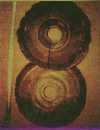
The Dropa Stones
The story of the Dropa for us begins in the same place, but the year is 1938. The mountains are the Baian-Kara-Ula mountains on the border that divides China and Tibet. An archaeological expedition, led by Chi Pu Tei, has trudged into the barely accessible mountain range, and has happened upon some caves that had obviously been occupied by a primitive people long ago.On the walls were carved pictograms of the heavens: the sun, the moon, the stars, and the Earth with lines of dots connecting them. Then the team made the most incredible discovery of all. Half-buried in the dirt floor of the cave was an odd stone disk, obviously fashioned by the hand of an intelligent creature. The disk was approximately nine inches in diameter and three-quarters of an inch thick. In the exact center was a perfectly round, 3/4" hole, and etched in its face was a fine groove spiraling out from the center to the rim, making the disk look for all the world like some kind of primitive phonograph record.This one plate, dated to be between 10,000 and 12,000 years old , but the wonder was multiplied manifold. In all, 716 such plates were found. And each held an incredible secret. The groove, upon further inspection, was not a groove at all, but a continuous line of strange carved hieroglyphics - writing!

Dr. Tsum Um Nui , in 1962, painstakingly transcribed the characters from the disk to paper. The writing was so small he had to use a magnifying glass to see it clearly. But the stones were old - perhaps 12,000 years old, it was estimated - and much of the hieroglyphics were difficult to make out or had been worn away by time and the elements. As he worked, many questions nagged the professor. How did these primitive people fashion these precise stones? How did they manage the almost microscopic writing? Who were they and what was the purpose of these hundreds of stones? Once the characters were transcribed, Dr. Tsum Um Nui began the arduous task of trying to decode its message. Eventually, he began to make progress. A word emerged. Then another. A phrase became understandable, then an entire sentence. He had broken the code. He discerned that the messages on the stones were written by a people who called themselves the Dropa. But what they were saying to him 12,000 years later made no sense. What the Dropa had written must have been one of their cultural myths, or was part of some prehistoric religious ceremony.
Or was it? When he had completed the translation the professor wrote up a paper on his findings and presented it to the university for publication. Their reaction was swift and emphatic: the paper would not be published. The Academy of Prehistory expressly forbade him to publish or even speak of his findings. The world, the academy decided, should not know about the Dropa and their fateful journey to Earth.The Dropa disks tell the story of a space probe from a distant planet that crash-landed in the Baian-Kara-Ula mountains of the Himalayas. The occupants of the spacecraft - the Dropa - found refuge in the caves of the mountains.The stones go on to say how the Dropa were unable to repair their disabled spacecraft and could not return to their home planet, and so were stranded on Earth. If that's true, have their descendents survived?

The Dogons
The Dogons are a people well known by their cosmogony, their esotericism, their myths and legends that interest foreigners at the highest point in search for culture or tourism.
The population is assessed to be about 300,000 people living in the South West of the Niger loop in the region of Mopti in Mali (Bandiagara, Koro, Banka), near Douentza and part of the North of Burkina (North west of Ouahigouya).
The Dogon's (Mali, Africa) homeland has been designated a World Heritage site for its cultural and natural significance. They are also famous for their artistic abilities and vast knowledge about astrology, especially the Sirius star, which is the center of their religious teachings. The Dogons know that Sirius A, the brightest system in our firmament, is next to a small white dwarf called Sirius B, which was not identified by western scientists until 1978. The Dogons knew about it at least 1000 years ago. Sirius B has formed the basis of the holiest Dogon beliefs since antiquity.
Western astronomers did not discover the star until the middle of the nineteenth century, and it wasn't even photographed until 1970.
The Dogons go as far as describing a third star in the Sirius system, called "Emme Ya" that, to date, has not been identified by astronomers. In addition to their knowledge of Sirius B, the Dogon mythology includes Saturn's rings and Jupiter's four major moons. They have four calendars, for the Sun, Moon, Sirius, and Venus, and have long known that planets orbit the sun.
How this Dogon's Enigmatic Scientific Knowledge about Astronomy came from? According to their oral traditions, a race people from the Sirius system called the Nommos visited Earth thousands of years ago. The Nommos were ugly, amphibious beings that resembled mermen and mermaids. They also appear in Babylonian, Accadian, and Sumerian myths. The Egyptian Goddess Isis, who is sometimes depicted as a mermaid, is also linked with the star Sirius. The Nommos, according to the Dogon legend, lived on a planet that orbits another star in the Sirius system. They landed on Earth in an "ark" that made a spinning decent to the ground with great noise and wind. It was the Nommos that gave the Dogon the knowledge about Sirius B !
(Picture: The original Dogon couple.This is one of the greatest symbols of the Dogon civilization. Sculpting represents spouses)
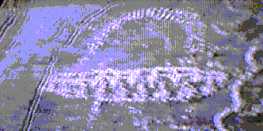
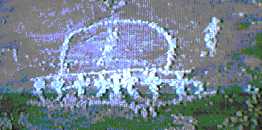
These ufo petroglyphs were created thousands of years ago by ancient Indians in the American Southwest. According to Indian folklore, two objects collided high in the sky and one crash-landed in the region of Death Valley. Some men arrived (presumably in another ship) and spent some time repairing the damaged Craft and were observed by the local Indians. The two images below may possibly depict the ship (left) used by the men who came to repair the damaged craft. In comparing the two images, the one on the right seems to depict structural damage around the edges and the bottom. Could it be the one that allegedly crashed? The images are stills taken from an old TV series entitled "In search of..." hosted by Leonard Nimoy.
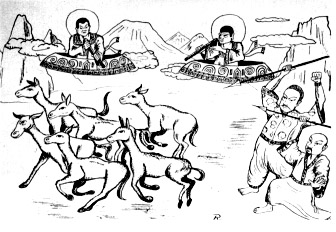
This is an artistic reproduction of a relief found in a labyrinth on the island Jotuo in the Toengt'ing lake. An expedition took place in 1957 (two years before an earthquake in that region). The expedition was led by professor Tsj'i Pen-Lai. They found various reliefs showing "humans" in strange clothes which looked like astronaut suits (hose like objects attached to the clothes). They also found a painting which apparently resembled the solar system. The third and fourth circle (planet) were connected with a line. Also there were ten planets (excluding the sun as planet). This connects easily to the theories about Nibiru, planet X, etc.
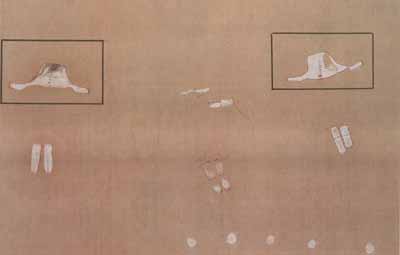
These are two cave paintings from Tanzania. Both are estimated to be up to 29,000 years old. The one on the left is located in Itolo and depicts several disc shaped objects. The other painting is from Kolo shows four entities surrounding a women. Notice also the entity looking down from inside some sort of box or object.
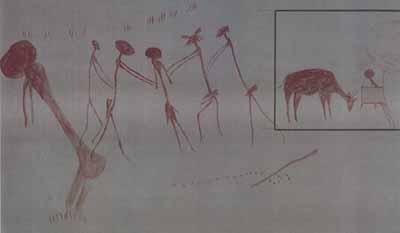
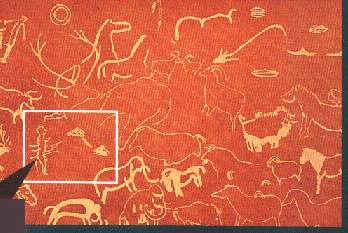
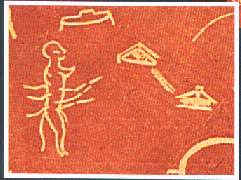
This two images are from France, the cave of "Pech Merle" near "Le Cabrerets" c.17,000 - 15,000 BC. The scene depicts a landscape full of wildlife together with a number of saucer shaped objects. The objects seem totally out of context.
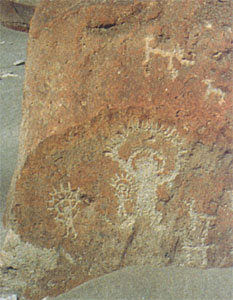

These two examples of rock art are from Toro Muerto,Peru 12-14,000 years old. Notice the beings have some sort of halo or covering over their heads (compare with the Val Camonica photo below). Also, in the right hand picture there is some sort of object left of the main being. Possibly a UFO ?
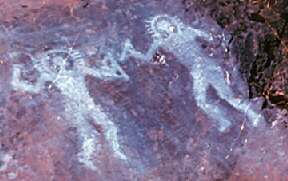
This cave painting is c.10,000 BC and is from Val Camonica, Italy. It appears to depict two beings in protective suits holding strange implements.
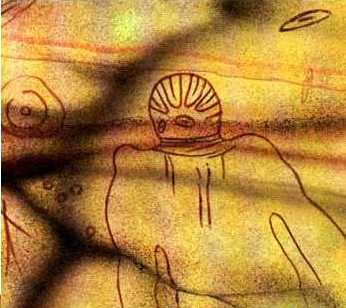
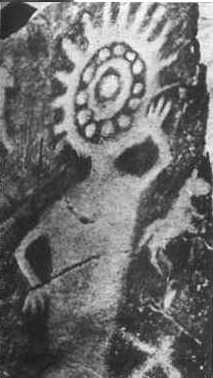
Two images c.6000 BC from Tassili, Sahara Desert, North Africa. They do not look human do they ? Also notice the disk in the sky in left hand picture.
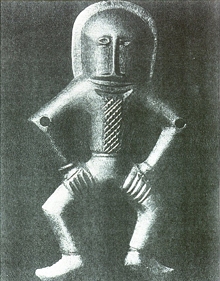
This strange suited figure was found in Kiev and I believe its dated to 4,000 BC.